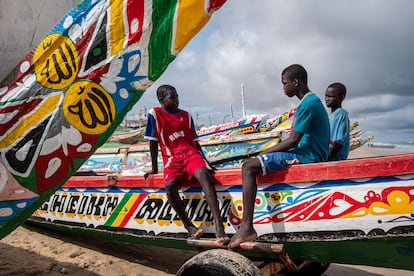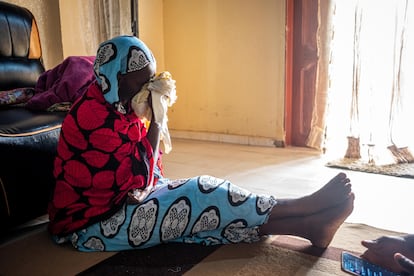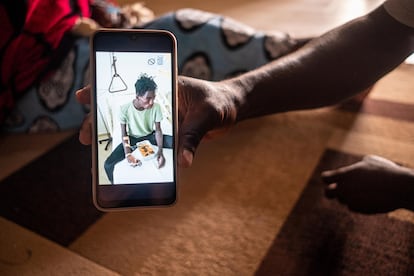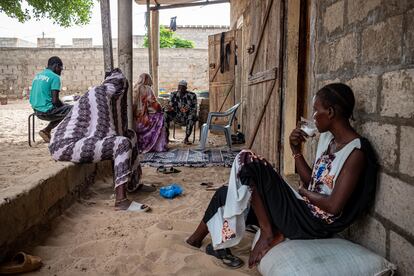Fas Boye, the close-knit community where the Senegal migrant boat disaster hits home
A small vessel set sail from the coastal town for the Canary Islands before drifting for a month, leaving more than 90 dead and relatives to mourn those who departed

After 10 days the concern began. By then, fisherman Arona Boye knew that his son was on his way to the Canary Islands. Pape Mambaye, 25, saw little point in a fisherman’s existence — due to overfishing, there are fewer and fewer in Senegalese waters. He wanted to go to Europe. But the journey from the Senegalese coast to the Spanish island of Tenerife takes about a week, a little longer if the sea is rough. Boye and dozens of other fishermen decided to search for the ship, possibly adrift, themselves. “But the range of a pirogue (a wooden fishing boat) is small,” the fisherman sighs, sitting in a plastic chair in his yard littered with fishing nets. “We had no idea where to look.”
In the weeks that followed, he and his fellow villagers became increasingly desperate. Boye and the other fishermen searched in vain for a large pirogue, which left Fas Boye on July 10. Although the more than 100 people believed to have been on board came largely from this small fishing village 120 kilometers (75 miles) north of the capital, Dakar, many villagers say they had no idea that their loved ones wanted to make the crossing to the Spanish archipelago. In the absence of any sign of life, the villagers sound the alarm: at their insistence, the Moroccan and Spanish coastguards unsuccessfully searched for the missing boat. Only last Wednesday, more than a month after its departure, would more news arrive.

The boat was spotted by a Spanish vessel, about 275 kilometers (170 miles) from the Cape Verdean island of Sal. Thirty-eight people, including several children, have been rescued. The other 72 people on board probably died of hunger and thirst — news that hit the conservative-Islamic fishing community of only 20,000 hard. Relatives rushed to deputy mayor Moda Samb, who was in contact with the Cape Verdean authorities. The village chief Madiop Boye, who lives opposite the fisherman Arona Boye, was also kept informed of events via telephone.
“Since Wednesday, anyone looking for news has been coming to the chef de village,” Boye says, with bloodshot eyes, “which means many are also coming to us to offer their condolences.” Dozens of people on board are still missing at sea, which in reality means that they are presumed — the boat did not capsize. Although Boye doesn’t yet know whether his son belongs to those missing from the vessel, or is among the survivors rescued by the Cape Verdean authorities, he is hopeful: he does not want condolences. “One of the survivors said he saw my son in the hospital,” he says, uncertainly. His wife, lying behind him at the foot of their bed, bursts into tears.

In the tiled guest room of village chief Madiop Boye, on the other side of the dirt road, Boye’s wife’s lament echoes in the background. Although the village chief seems to have gotten used to it by now, he looks tense. “Our village has never seen anything like this before,” he murmurs in a low voice. “We are devastated and defeated,” he says, twisting the prayer beads in his hand. His sons and daughters are still in the village, he explains, but there are six members of his extended family who they have not yet heard from. Everyone here knows someone who was on the boat.
A little further on, on a square between four low buildings that serve as an open-air mosque, that statement turns out to be correct. Cousins, sisters, the children of neighbors, brothers-in-law: everyone present knows at least one of the people on board. In the corner of the prayer room, on the women’s side, Maryam Sowe is crying with a yellow cloth pressed to her face. Her 35-year-old son Pape is among the confirmed dead: his body was found on the pirogue. “I have no idea why he left,” she says when she has regained her composure. “We have a good life, he always said he would stay with us.” She fights back the tears. “Allah sent him to help his parents, all we have to do is be patient.”

Anger in the streets
Yet there is also a lot of anger in the streets of Fas Boye. If the Senegalese authorities had searched for the missing boat, the local residents believe, it would have been found weeks ago and the people on board would still be alive. Dissatisfaction with the lax attitude of the authorities has even led to riots, looting and destruction of property. A group of young residents of Fas Boye took to the streets on Wednesday evening, attacking government buildings such as the local school. A field belonging to deputy mayor Samb also went up in flames. He says he has asked the authorities several times to intervene, without receiving a response.
“I understand perfectly why young people are angry,” says Madiop Boye in a trembling voice. “But of course we strongly disapprove of violence.” Then his son bursts into the reception room, whispering something in Boye’s ear. The village elder lets out a cry and stands up immediately. “Arona’s son died,” he says, striding toward the house on the other side of the dirt road. Dozens of people have already gathered in the yard: women are lying on the floor crying. Arona Boye sits, defeated, in his plastic chair, his face buried in his hands. Next to him, his wife is lying on the floor, screaming and kicking. “This is the fate of Fas Boye,” says the village elder, observing the grief. “We have nothing left but to pray.”
Sign up for our weekly newsletter to get more English-language news coverage from EL PAÍS USA Edition
Tu suscripción se está usando en otro dispositivo
¿Quieres añadir otro usuario a tu suscripción?
Si continúas leyendo en este dispositivo, no se podrá leer en el otro.
FlechaTu suscripción se está usando en otro dispositivo y solo puedes acceder a EL PAÍS desde un dispositivo a la vez.
Si quieres compartir tu cuenta, cambia tu suscripción a la modalidad Premium, así podrás añadir otro usuario. Cada uno accederá con su propia cuenta de email, lo que os permitirá personalizar vuestra experiencia en EL PAÍS.
¿Tienes una suscripción de empresa? Accede aquí para contratar más cuentas.
En el caso de no saber quién está usando tu cuenta, te recomendamos cambiar tu contraseña aquí.
Si decides continuar compartiendo tu cuenta, este mensaje se mostrará en tu dispositivo y en el de la otra persona que está usando tu cuenta de forma indefinida, afectando a tu experiencia de lectura. Puedes consultar aquí los términos y condiciones de la suscripción digital.








































